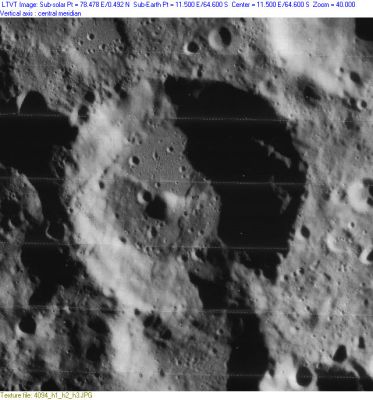Difference between revisions of "Pentland"
| (One intermediate revision by the same user not shown) | |||
| Line 6: | Line 6: | ||
|} | |} | ||
<div id="toc"> | <div id="toc"> | ||
| − | + | [[Image:Normal_Pentland_LO-IV-094H_LTVT.JPG|external image normal_Pentland_LO-IV-094H_LTVT.JPG]]<br /> ''[http://lpod.org/coppermine/displayimage.php?pos=-1616 LO-IV-094H]''<br /> <br /> | |
| − | |||
==Images== | ==Images== | ||
[http://www.lpod.org/coppermine/thumbnails.php?album=search&type=full&search=Pentland LPOD Photo Gallery] [http://www.lpi.usra.edu/resources/lunar_orbiter/bin/srch_nam.shtml?Pentland%7C0 Lunar Orbiter Images]<br /> <br /> | [http://www.lpod.org/coppermine/thumbnails.php?album=search&type=full&search=Pentland LPOD Photo Gallery] [http://www.lpi.usra.edu/resources/lunar_orbiter/bin/srch_nam.shtml?Pentland%7C0 Lunar Orbiter Images]<br /> <br /> | ||
| Line 15: | Line 14: | ||
<br /> | <br /> | ||
==Description: Elger== | ==Description: Elger== | ||
| − | ''([[IAU% | + | ''([[IAU%20directions|IAU Directions]])'' PENTLAND.--A fine conspicuous formation under a low sun, even in a region abounding in such objects. It is about 50 miles in diameter, with a border exceeding in places 10,000 feet in height above the floor, which includes an especially fine central mountain.<br /> <br /> |
==Description: Wikipedia== | ==Description: Wikipedia== | ||
[http://en.wikipedia.org/wiki/Pentland_(crater) Pentland]<br /> <br /> | [http://en.wikipedia.org/wiki/Pentland_(crater) Pentland]<br /> <br /> | ||
==Additional Information== | ==Additional Information== | ||
| − | * Depth data from [[Kurt%20Fisher% | + | * Depth data from [[Kurt%20Fisher%20Crater%20Depths|Kurt Fisher database]] |
** Westfall, 2000: 4.01 km | ** Westfall, 2000: 4.01 km | ||
** Cherrington, 1969: 3.1 km | ** Cherrington, 1969: 3.1 km | ||
| − | * According to [[LTVT|LTVT]] the shadows in LO-IV-094H indicate a maximum depth of 3950 m. The "fine" central peak, mentioned by Elger, rises 790 m. <span class="membersnap">- | + | * According to [[LTVT|LTVT]] the shadows in LO-IV-094H indicate a maximum depth of 3950 m. The "fine" central peak, mentioned by Elger, rises 790 m. <span class="membersnap">- Jim Mosher</span> |
<br /> | <br /> | ||
==Nomenclature== | ==Nomenclature== | ||
| Line 34: | Line 33: | ||
<br /> <br /> | <br /> <br /> | ||
---- | ---- | ||
| − | + | </div> | |
Latest revision as of 02:09, 16 April 2018
Contents
Pentland
|
Lat: 64.6°S, Long: 11.5°E, Diam: 56 km, Depth: 4.01 km, Rükl 73 |
Images
LPOD Photo Gallery Lunar Orbiter Images
Maps
(LAC zone 138A1) USGS Digital Atlas PDF
Description
Description: Elger
(IAU Directions) PENTLAND.--A fine conspicuous formation under a low sun, even in a region abounding in such objects. It is about 50 miles in diameter, with a border exceeding in places 10,000 feet in height above the floor, which includes an especially fine central mountain.
Description: Wikipedia
Additional Information
- Depth data from Kurt Fisher database
- Westfall, 2000: 4.01 km
- Cherrington, 1969: 3.1 km
- According to LTVT the shadows in LO-IV-094H indicate a maximum depth of 3950 m. The "fine" central peak, mentioned by Elger, rises 790 m. - Jim Mosher
Nomenclature
- Joseph Barclay Pentland (1797 - 1873) was an Irish geographer, natural scientist, and traveller. With Woodbine Parish, Pentland surveyed a large part of the Bolivian Andes between 1826 and 1827.
- Related material on other features named after Irish scientists.
LPOD Articles
Bibliography
